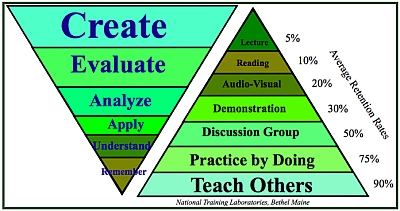
Why Not Lecture?
updated May 2, 2018Tons of evidence--here are just a few examples.
Note the low level of retention for lectures in the 2 diagrams to the right. The left portion refers to Bloom's Taxonomy of the Cognitive Domain. Higher order thinking skills correlate with more effective learning as do active-learning practices. Results for online talking head lectures are even more dismal. You practice active learning in HI 216 online--not passive listening.
The more students do with information, the more they learn. Sitting and passively listening does not engage the student mind.Hake, R. 2002. Lessons from the physics education reform effort. Conservation Ecology 5(2): 28 The lower graph is taken from Hake. Easy to interpret-- minimal gain from pretest in classes using lecture (red). Much greater gain for classes using active learning methods (green) which tap higher-order thinking skills. Moral: Do something with information and you own it. Passive listening is lame.
As the chart above illustrates, retention of information is the lowest level of cognitive effort, yet lecture again fails at this elemental task. And this doesn't even take into account higher-level goals, such as understanding and applying the information.
American Library Association Positions on Information Literacy and University Learning, Presidential Committee on Information Literacy. Report released January 10, 1989, Washington, D.C. Education needs a new model of learning-learning that is based on the information resources of the real world and learning that is active and integrated, not passive and fragmented. On an intellectual level, many teachers and school administrators recognize that lectures, textbooks, materials put on reserve, and tests that ask students to regurgitate data from these sources do not create an active, much less a quality, learning experience. Moreover, studies at the higher education level have proven that students fail to retain most information they are "given." The curve for forgetting course content is fairly steep: a generous estimate is that students forget 50% of the content within a few months.... A more devastating finding comes from a study that concluded that even under the most favorable conditions, "students carry away in their heads and in their notebooks not more than 42% of the lecture content." Those results came when students were told that they would be tested immediately following the lecture; they were permitted to use their notes; and they were given a prepared summary of the lecture. Effective learning should actively involve students in the process of:
- knowing when they have a need for information
- identifying information needed to address a given problem or issue
- finding needed information and evaluating the information
- organizing the information
- using the information effectively to address the problem or issue at hand.
Such a restructuring of the learning process enhances the critical thinking skills of students and empowers them for lifelong learning and the effective performance of professional and civic responsibilities. These results were bad enough, but when students were tested a week later, without the use of their notes, they could recall only 17%of the lecture material.( K. Patricia Cross, "A Proposal to Improve Teaching or What Taking Teaching Seriously Should Mean," AAHE Bulletin 39, Sep 1986: 10-11). Poor student learning from lectures extends across all disciplines, including STEM courses.
Active learning increases student performance in science, engineering, and mathematics This meta-analysis of 225 previous studies, published in Proceedings of the National Academy of Sciences, compared classes using only lectures only versus those that incorporate group problem-solving, workshops or other forms of active learning. Active learning sections raised exam grades half a letter grade. Lectures sections had a 55% higher failure rate. Current evidence suggests that a constructivist 'ask, don't tell' approach may lead to strong increases in student performance Major STEM education conferences concludes lectures ineffective for student learning